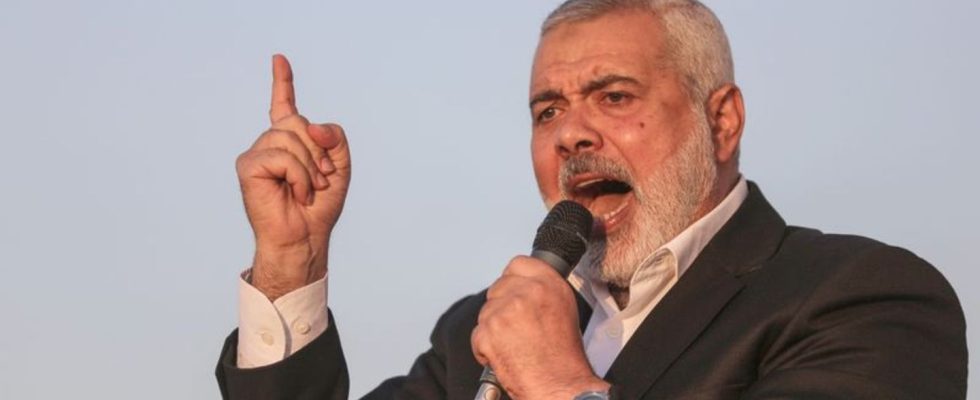War in the Middle East
Sons and grandsons of Hamas leader killed in Israeli attack
Ismail Hanija has lived in Qatar for years. photo
© Wissam Nassar/dpa
Hamas’s foreign chief is reportedly living a life of luxury in Qatar while Palestinians in the Gaza Strip live in disastrous conditions. Hanija now has to mourn victims in her immediate family.
During an Israeli airstrike in According to the Islamist Hamas, three sons and three grandchildren of Hamas foreign chief Ismail Haniya were killed in the Gaza Strip. They were hit in a vehicle in the Al-Shati refugee camp in the northern part of the coastal strip.
The Israeli army said three members of the Hamas military wing were “taken out” by a fighter jet attack during terrorist activities in the Gaza Strip. The military confirmed that these were the sons of Haniah. However, there was no confirmation of the deaths of three grandchildren in the incident.
“I thank God for the honor he bestowed on us with the martyrdom of my three sons and some grandchildren,” the Qatari television channel Al-Jazeera quoted the Hamas leader as saying. A video showed Hanija receiving the news of the death of his children and grandchildren while showing little emotion.
Muslims around the world celebrated the first day of celebration at the end of the fasting month of Ramadan on Wednesday. The Arabic television channel Al-Jazeera reported, citing eyewitnesses in the Gaza Strip, that Hanija’s sons and grandchildren were traveling in a car to celebrate with other family members. This information cannot currently be independently verified.
Haniya is considered the “overarching” head of Hamas
Haniya, head of the Hamas politburo, has reportedly been living a luxurious life in Qatar with part of his family for years. He has been chairman of Hamas’ political bureau since 2017. He was confirmed in his office for another four years by the so-called Shura Council in 2021. He is considered the “overarching” head of the Islamist Hamas, while Jihia al-Sinwar is the head of the Gaza Strip. Hanija was born in the Al-Shati refugee camp in 1963 and grew up there in poor conditions.
Hamas was founded in 1987 as an offshoot of the Egyptian Muslim Brotherhood during the first Palestinian Intifada uprising against Israeli occupation. The Politburo is considered the highest decision-making body and has 15 members.
In the Hamas terrorist attack on the Israeli border area on October 7th, which triggered the Gaza war, more than 1,200 people were killed and over 250 people were kidnapped into the Gaza Strip. Israel then announced the targeted killing of Hamas leaders. According to the Hamas Interior Ministry, several members of Haniya were killed in an Israeli attack in the Gaza Strip in October.
Haniya said the attack was evidence of Israel’s “failure” and would not affect Hamas’s positions in indirect negotiations over a ceasefire and release of more hostages, Al-Jazeera broadcaster reported. Hamas continues to insist on a permanent ceasefire and the return of Palestinian refugees to their homes. Israel rejects a permanent end to the war without a decisive victory over Hamas.
“If they think that targeting my children at the height of these talks – before the (Hamas) movement has submitted its response – will persuade Hamas to change its positions, then they are insane,” Haniya told Blick on Israel. “The blood of my children is no more valuable than the blood of the children of the Palestinian people,” Haniya said, according to Al Jazeera. “All the martyrs of Palestine are my children.”
At the beginning of the month, Israeli police had already arrested one of Hanija’s sisters, who lives in southern Israel. The 57-year-old is suspected of “having maintained contact with Hamas activists,” the police said in a statement. She identifies with a terrorist organization and is accused of inciting and supporting terrorist attacks in Israel.
Targeted attacks on Hamas leaders
Israel has repeatedly targeted political and military leaders of Hamas and other militant Palestinian organizations in the past. The failed assassination of Hamas leader Khaled Mashaal in Amman in 1997 is considered one of the biggest failures in the history of Israel’s foreign intelligence agency Mossad.
As part of its efforts to appease Jordan, Israel was also forced to release influential Hamas spiritual leader Ahmed Yassin. In 2004, Yassin, who was sitting in a wheelchair, also died in a targeted Israeli air strike. Israel later also killed his successor Abdel Asis Rantisi and, in 2012, Hamas military chief Ahmed Jabari.
In such targeted attacks, uninvolved people are often killed. Mohammed Deif, leader of Hamas’s military wing, has survived several attempts to kill Israel. However, his wife and young son were killed in an airstrike on a house in Gaza towards the end of the Gaza war in 2014.
The bombing of Hamas leader Salah Shehade’s house in Gaza in July 2002 also killed 14 innocent Palestinians, including several of his children.
The practice of targeted killing is controversial, and its effectiveness is often questioned even in Israel itself. However, after the massacre on October 7th, Israel announced that it would eliminate the Hamas leadership.

